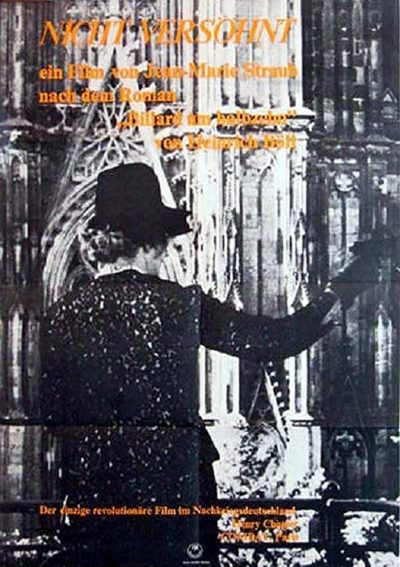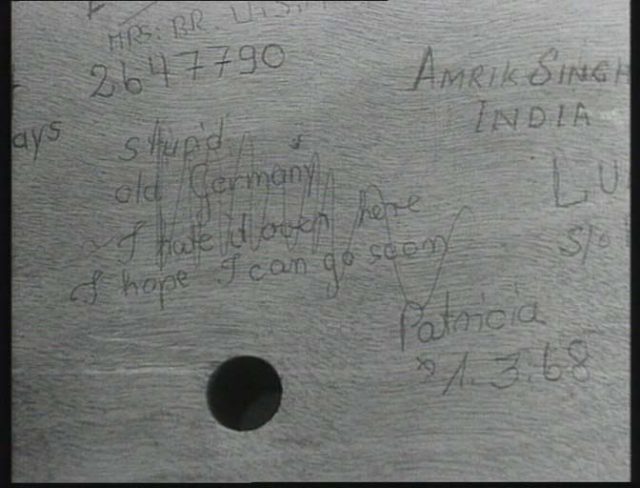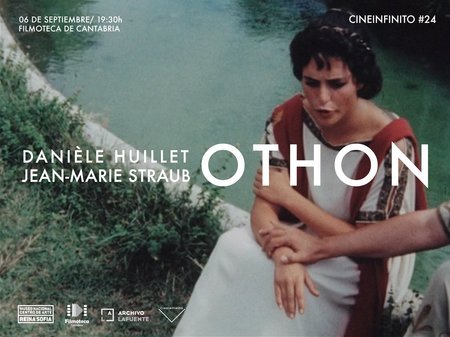Quote:
Straub-Huillet’s first color film, Othon (Les yeux ne veulent pas en tout temps se fermer, ou Peut-être qu’un jour Rome se permettra de choisir à son tour) adapts a lesser-known Corneille tragedy from 1664, which in turn was based on an episode of imperial court intrigue chronicled in Tacitus’s Histories. The costuming is classical, and the toga-clad, nonprofessional cast performs the drama’s original French text amid the ruins of Rome’s Palatine Hill while the noise of contemporary urban life hums in the background. Their lines are executed with a terrific flatness and frequently through heavy accents; the language in Othon becomes not merely an expression but a thing itself, an element whose plainness here alerts us to qualities of the work that might otherwise be subordinated. “If at every moment one can keep one’s eyes and ears open to all of this,” Straub wrote, “it’s possible to even find the film thrilling and note that everything here is information—even the purely sensual reality of the space which the actors leave empty at the end of each act.Read More »
Jean-Marie Straub
-
Danièle Huillet & Jean-Marie Straub – Les yeux ne veulent pas en tout temps se fermer, ou Peut-être qu’un jour Rome se permettra de choisir à son tour AKA Eyes Do Not Want to Close at All Times or Perhaps One Day Rome Will Permit Herself to Choose in Her Turn AKA Othon (1970)
1961-1970ArthouseDanièle HuilletFranceJean-Marie StraubPolitics -
Danièle Huillet & Jean-Marie Straub – Umiliati (2003) (DVD)
2001-2010ArthouseDanièle HuilletDramaFranceJean-Marie Straub
This is the sequel to the Straubs’ Operai, contain.
Excerpts from the novel Donna di Messina (1949 and 1964, 1967) by Elio Vittorini (1908-1966).Read More »
-
Jean-Marie Straub – Dialogue d’ombres AKA Dialogue of Shadows (2013)
2011-2020ArthouseFranceJean-Marie StraubShort Film
Synopsis
Jean-Marie Straub’s new film closes the circle. The years 1954–2013 are displayed as representing a film produced in collaboration with Danièle Huillet. The two had met in Paris in 1954, around the year they came across the text by Georges Bernanos, to whom Straub has now dedicated a half-hour film. A man and a woman engaged in a dialogue, talking about their love, as if talking across an abyss. Then, in the last take, the two of them close together, motionless for a long time.Read More » -
Jean-Marie Straub – Nicht versöhnt oder Es hilft nur Gewalt wo Gewalt herrscht AKA Not Reconciled (1965)
1961-1970ArthouseGermanyJean-Marie StraubShort Film
JONATHAN ROSENBAUM:
Quote:“Far from being a puzzle film (like Citizen Kane or Muriel), Not Reconciled is better described as a ‘lacunary film’, in the same sense that Littré defines a lacunary body: a whole composed of agglomerated crystals with intervals among them, like the interstitial spaces between the cells of an organism”. Jean-Marie Straub’s description of his second film and second Heinrich Böll adaptation (after Machorka-Muff) helps to explain why, although it has more plot than any of his other works — containing even more characters and intrigues than Othon — it is virtually impossible to paraphrase in the form of a synopsis. Read More »
-
Danièle Huillet & Jean-Marie Straub – Chronik der Anna Magdalena Bach AKA The Chronicle of Anna Magdalena Bach (1968) (HD)
1961-1970Danièle HuilletGermanyJean-Marie Straub
Jean-Marie Straub’s 1967 film of the marriage between the widower Bach and Anna Magdalena. The film has a musical structure that is very much like Bach’s own St. Matthew Passion; and Straub uses the format of Bach’s music to etch a minimalist love story of enormous richness. ” Also, includes live performancesRead More »
-
Danièle Huillet & Jean-Marie Straub – Proposta in quattro parti (1985)
Arthouse1981-1990ClassicsDanièle HuilletItalyJean-Marie Straub
More material from Straub and Huillet. RAI TV capture.
Proposta 1: Accaparramento di granoRead More »
-
Jean-Marie Straub – Der Bräutigam, die Komödiantin und der Zuhälter AKA The Bridegroom, the Actress and the Pimp (1968)
1961-1970DramaGermanyJean-Marie StraubShort Film
A short film starring Fassbinder and some of his regular players.
From an interview with the director, Straub:
“STRAUB: I don’t believe in the cinema. Even when it’s Godard who says these things, it’s interesting and has meaning, but it gives me a stomach ache. I don’t fetishize the cinema at all. I think of it as an instrument, a tool. I could say that the deconstruction one makes in THE BRIDEGROOM, THE ACTRESS, AND THE PIMP is interesting, but the whole film is the history, the story, of a hatred and that is all. The hatred is affirmed at the beginning, in the inscription on the wall:
“Stupid old Germany. I hate it over here. I hope I can go soon.”Read More »
-
Jean-Marie Straub – L’inconsolable (2011)
2011-2020ArthouseItalyJean-Marie Straub
L’Inconsolable
2010, 14 minutes 44 secondes, couleur
D’après L’inconsolabile, Dialogues avec Leucò de Cesare Pavese.Sept des Dialogues avec Leucò (1947) sont mis en scène dans De la Nuée à la résistance (1979), cinq le sont dans Ces rencontres avec eux (2006). Le genou d’Artémide (2009), Femmes entre elles (2009) puis L’inconsolable (2011) en constituent donc les treizième, quatorzième et quinzième adaptations.Read More »
-
Jean-Marie Straub – Kommunisten (2014)
2011-2020ExperimentalFranceJean-Marie StraubPolitics
Jean-Marie Straub pushes this musicality of blocks to a paroxysmal extreme, mixing blocks of time (40 years separate the various extracts that are going to be used, and what is to be filmed), blocks of text (Malraux, Fortini, Vittorini, Hölderlin) and blocks of language (French, Italian, German), and from this ruckus emerges the history of the world, yes, History with a capital H, and from the same movement, the political hope of its being overtaken. So this is an adventure film, about the Human adventure, still one that is always, in the end, overtaken by Nature.Read More »

